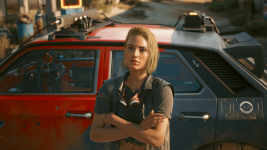My issue with the writing is one moment I felt ownership of V and the next it's as if the game commandeered my character to progress it's narrative as it deemed fit. I cannot recall many, if any, other RPG's I've played personally with a supposed player built character where this happened. The narrative pushed events forward as it deemed fit, as they all must, but didn't dictate how my character responded to them in the process.I think the writing in the overall sense (plot, themes, etc.), and quest design, are pretty good in the game, there are a lot of interesting quests and the main quest is thought-provoking (re. what is soul, consciousness, etc.) and is about the same as a standard movie.
I think you might be right that the writing in the sense of the written dialogue often leaves something to be desired though, and the voice acting is variable - sometimes its excellent, sometimes the tone is off, but that's maybe to be expected if chunks of the dialogue are goofy. It's hard for an actor to interpret goofy
The brilliance of TW3 was it took an established, predefined player character, paired it with a cinematic narrative and still managed to create the sense the player was in the driver seat of that character. It presented various, and at times competing, options for the player to pick from to express Geralt. All of which could be argued as being a proper fit for that established character. None of this is easy to pull off.
I think an undefined player character can be paired with a cinematic narrative and made to work, while achieving this feeling of ownership over the character and providing interesting, meaningful choices. However, it's a much more difficult task to get right. CP, to me, was a mixed bag in this regard. In some cases it pulled it off. In others it flopped. I don't think it's a great mystery why. The way it was constructed simply didn't deliver in some cases.
Perhaps this is what the OP meant when talking about traditional vs non-traditional RPG's. If you wish to dictate how the character responds to the events in front of them, for whatever reason, then use a completely defined character and ask the player to assume this role. If you wish to give the player an opportunity to fabricate a character give them complete authority over it. You cannot do both. You'll inevitably end up with inconsistencies.
In a sense, yes. Regardless, much of this can be mitigated by incorporating enough options for the player when opportunities for making a meaningful choice occur. After all, voice tone, mannerisms, etc. tend to be a product of intent. Even if one type of intent does not fit what the player envisioned for one option another option might not cause such a conflict. Or, at the very least, hit the mark close enough.At any rate, I think the point is good that if you "fill in" too much dialogue for the player protagonist in an RPG, it squeezes out the space for the player to interpret who their character is. And V's responses are very often too detailed, too specific and rich, for the player to get a mental word in edgewise.
This is a part of where the comment on interplay within the game came from. One player might not feel their version of V would wake up from bed after recovering from getting shot in the head, have their first real talk with Johnny and lose their shit on him. Perhaps this conflict goes poof if more options exist. Instead V could wake up and be dumbfounded with confusion with Johnny. They could have a more level headed response. One element, or the voice acting, might not fit but another, or more options, could mitigate the conflict and save the day, so to speak.
Alternatively, toss in a VO toggle. If you want the complete "cinematic experience" turn it on. If you want all things character voice related open ended put it to the disabled position. I can already see the bean counters reeling.
Of course, it does stand to reason pairing the right elements together makes the task that much easier. Using this as an advantage also makes a lot of sense.
Last edited:







